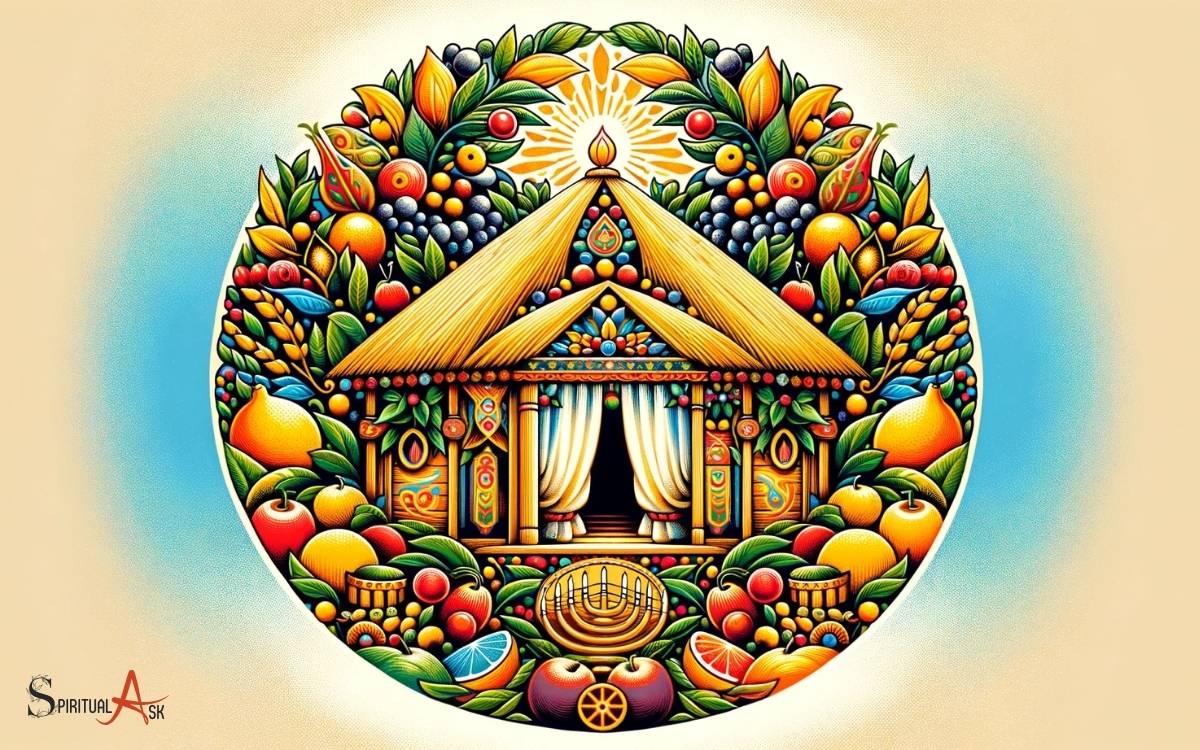What Does the Feast of Tabernacles Symbolize Spiritually?
The Feast of Tabernacles, also known as Sukkot, is a biblical Jewish holiday that has rich spiritual symbolism. It commemorates the Israelites’ forty-year journey in the wilderness after the Exodus from Egypt, during which they lived in temporary shelters (sukkot).
Spiritually, the feast symbolizes God’s provision and presence. It is a time of rejoicing and thanksgiving for the harvest and serves as a reminder of the impermanence of life and the importance of relying on God.
In Christian theology, the Feast of Tabernacles is seen as foreshadowing the return of Christ and the establishment of God’s kingdom on earth, where believers will dwell with Him forever.
The spiritual significance of the Feast of Tabernacles includes:
Example: During Sukkot, Jewish families often eat meals in the sukkah, a temporary hut, to connect with the historical and spiritual aspects of the feast.
The Feast of Tabernacles serves as a profound reminder of God’s sheltering presence and a celebration of divine provision

Key Takeaway
Historical Significance of the Feast
The historical significance of the Feast of Tabernacles lies in its dual role as a commemoration of the Israelites’ time in the wilderness and as a celebration of the harvest.
This festival holds great spiritual and historical importance for the Jewish people and also carries deep symbolism for Christians. It serves as a reminder of the Israelites’ dependence on God during their journey through the wilderness and their gratitude for the bountiful harvest. The celebration is marked by joyous gatherings, prayers, and rituals that reflect both faith and thanksgiving. For many, the festival also connects to the spiritual meanings of October, as this month often symbolizes reflection, renewal, and recognition of life’s blessings. Through its traditions, it offers an opportunity for communities to come together and honor both the past and the present with gratitude.
The Feast of Tabernacles also signifies the temporary dwellings the Israelites lived in during their time in the wilderness. This celebration promotes humility, gratitude, and reliance on the divine provision.
Understanding the historical roots of this feast helps us appreciate its spiritual significance and the enduring lessons it offers about faith, gratitude, and reliance on God.
Spiritual Themes of Gratitude
Symbolically, gratitude is a central theme in the Feast of Tabernacles, emphasizing the significance of acknowledging divine provision and blessings. As I reflect on this spiritual theme, I am reminded of the importance of gratitude in my own life.
The Feast of Tabernacles teaches us to be thankful for the abundance in our lives, both material and spiritual. It encourages us to appreciate the blessings we have received and to be mindful of the goodness that surrounds us.
Gratitude fosters a positive outlook and a humble heart, allowing us to recognize the hand of the divine in our lives.
It is a time to express our thankfulness for all that we have been given and to cultivate a spirit of appreciation for the many blessings we encounter each day.
Symbolism of Temporary Dwellings
Reflecting on the symbolism of temporary dwellings in the context of the Feast of Tabernacles, I am reminded of the profound spiritual significance attached to this aspect of the festival.
The temporary dwellings, also known as sukkahs, represent the impermanence of life and the reliance on divine providence. They serve as a reminder of the Israelites’ journey through the wilderness and the dependence on God for sustenance and protection.
This symbolism encourages humility and gratitude, as it emphasizes the transient nature of earthly existence and the importance of appreciating the blessings provided by the divine.
The act of dwelling in temporary shelters fosters a sense of unity and equality, as all individuals, regardless of their material possessions, share the experience of impermanence. It prompts us to focus on the spiritual and eternal aspects of life, fostering a deeper connection with the divine.
Unity and Communal Celebration
During the Feast of Tabernacles, I find myself drawn to the double preposition ‘in with,’ reflecting the unity and communal celebration experienced by the community.
This festival emphasizes the importance of coming together, setting aside differences, and celebrating as one. The act of dwelling in temporary shelters fosters a sense of togetherness, reminding us that we are all interconnected and interdependent.
The communal meals, shared rituals, and collective prayers during this time further reinforce the idea of unity and harmony within the community. It’s a time for rejoicing and strengthening bonds with one another, transcending individual concerns and focusing on the collective well-being.
This unity and communal celebration not only enriches the spiritual experience but also creates a strong sense of belonging and solidarity among the participants.
As we embrace these principles, we can draw parallels to our modern lives and derive valuable insights for our interconnected world today.
Modern Relevance and Application
In my view, the feast of Tabernacles holds contemporary significance and practical applications. This ancient festival still resonates with relevance in modern times, offering valuable lessons that can be applied in our daily lives.
- Celebrating Harvest: The feast of Tabernacles reminds us of the importance of gratitude and celebrating the blessings we have received, just as ancient Israelites celebrated their harvest. It encourages us to appreciate the abundance in our lives and share with those in need.
- Seeking God’s Presence: The feast also serves as a reminder to seek God’s presence and provision, acknowledging our dependence on Him for sustenance and guidance.
- Fostering Community: Additionally, the emphasis on communal living during the feast highlights the significance of coming together as a community, supporting and uplifting one another in our journey of faith.
Conclusion
The Feast of Tabernacles serves as a reminder to appreciate the temporary blessings in our lives, like the Israelites did in their journey.
Just as we build and dwell in sukkahs for a week, we should also take time to reflect on the impermanence of life and the importance of cherishing every moment.
Like the branches used in the celebration, let us remember to “bend but not break” in the face of life’s challenges.






